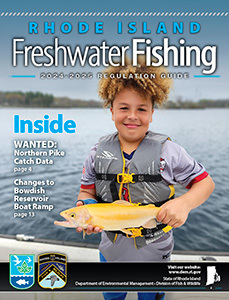Largemouth Bass Virus
Largemouth Bass Virus
The largemouth Bass Virus (LMBV) has been found to occur at three locations in Rhode Island: Olney Pond in Lincoln Woods State Park, Echo Lake in Pascoag, and Watchaug in Charlestown Pond. While LMBV has only proven fatal to largemouth bass, the virus has been found in some sunfish species such as bluegill and pumpkinseed. Common symptoms of the virus include hyper-buoyancy, spiral swimming, and lethargy, which are attributed to damage to the swim bladder. Infected fish may not exhibit any signs of the virus until it is activated by stressful environmental conditions such as high water temperatures, low oxygen levels, droughts, secondary injuries, or bacterial infections. These are conditions that could trigger LMBV and potentially cause fish kills. While fish health biologists have indicated that LMBV is a naturally occurring fish virus that does not pose a human health risk for people who eat or handle infected fish, all freshwater fish should be thoroughly cooked before being consumed. DEM’s Division of Fish and Wildlife advises anglers to minimize the spread of LMBV by not transplanting any fish from one water body to another; draining, cleaning and drying boats, motors and fishing gear between each use; not releasing bait fish into any water body; minimizing the stress to bass caught and released as much as possible during periods of high water temperatures; and reporting all fish kills to the Department at (401) 222-3070.

